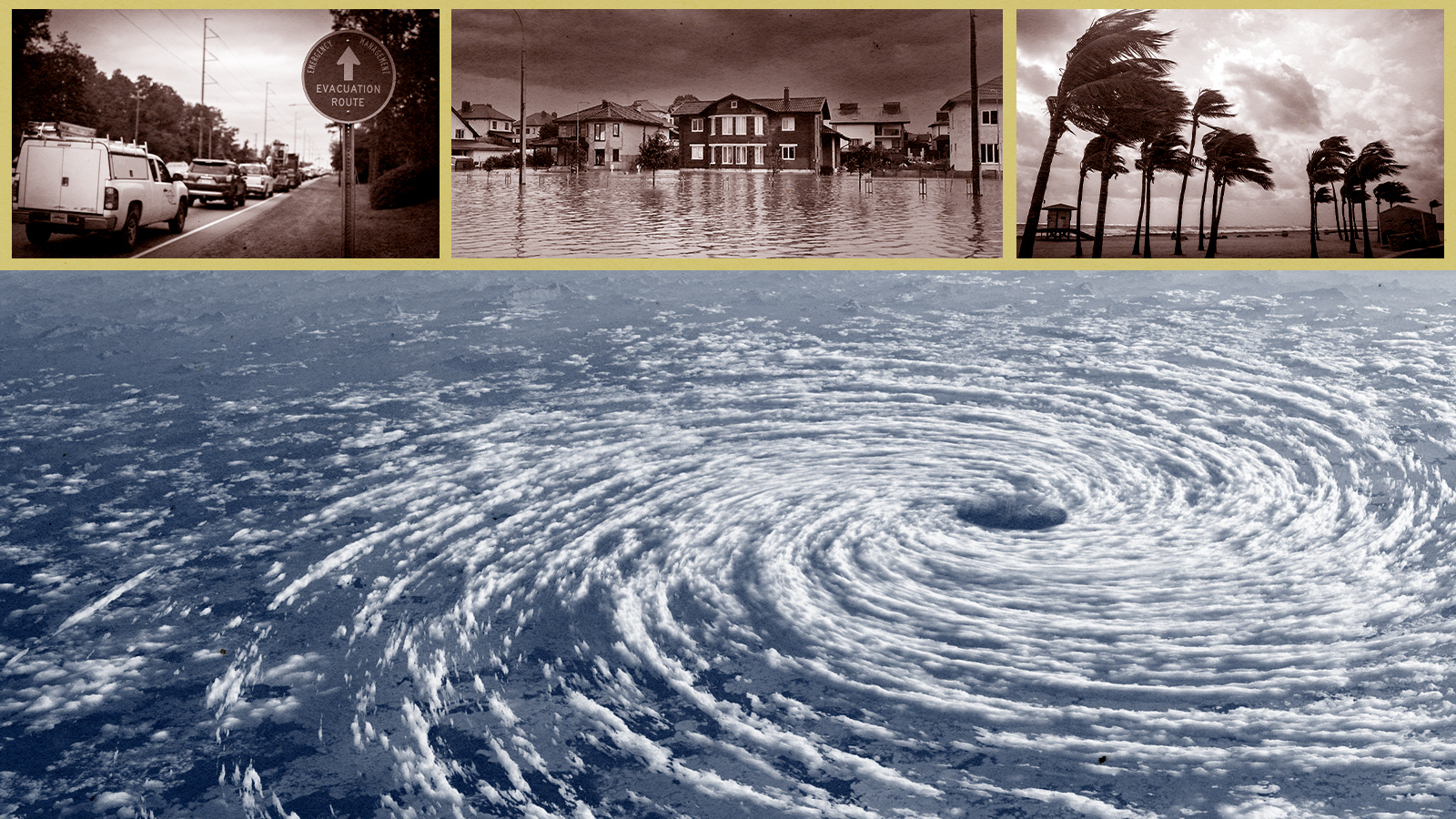Bracing for an 'above-average' hurricane season
Hurricane Agatha's record-setting landfall might only be the beginning


A free daily email with the biggest news stories of the day – and the best features from TheWeek.com
You are now subscribed
Your newsletter sign-up was successful
The 2022 Atlantic hurricane season starts June 1, and forecasters at the National Oceanic and Atmospheric Administration's Climate Prediction Center say there is a 65 percent chance it will be unusually active — and if their prediction is correct, this will be the seventh year in a row of above-average activity. Here's everything you need to know:
What does it mean for a hurricane season to be "above average?"
The National Hurricane Center says that in the Atlantic basin — which includes the Atlantic Ocean, Caribbean Sea, and Gulf of Mexico — the average hurricane season has 14 named storms, of which seven become hurricanes, with three of those Category 3 or greater. For 2022, forecasters are predicting there will be 14 to 21 named storms, of which six to 10 become hurricanes, with three to six being Category 3 or greater.
How long does the official Atlantic hurricane season last?
The Atlantic hurricane season runs from June 1 to Nov. 30, with 97 percent of tropical activity happening during that time period. Usually, the peak of activity is in the late summer and early fall.
The Week
Escape your echo chamber. Get the facts behind the news, plus analysis from multiple perspectives.

Sign up for The Week's Free Newsletters
From our morning news briefing to a weekly Good News Newsletter, get the best of The Week delivered directly to your inbox.
From our morning news briefing to a weekly Good News Newsletter, get the best of The Week delivered directly to your inbox.
How do meteorologists determine how busy a hurricane season will be?
They take several factors into consideration. One of the biggest indicators is the continued presence of La Niña, a weather event that cools parts of the equatorial Pacific. La Niña changes weather patterns around the world, and often leads to more Atlantic hurricanes. NOAA Meteorologists also found that sea surface temperatures are warmer than average in the Atlantic Ocean and Caribbean Sea, which can cause stronger hurricanes, and there is an enhanced African monsoon that supports stronger African easterly waves. Tropical cyclones often develop along easterly waves, which are oscillations in the trade winds that move from east to west.
What was the most active Atlantic hurricane season on record?
The 2020 season was the most active on record. The World Meteorological Organization maintains six rotating lists of 21 names used for Atlantic hurricanes, and the 2020 and 2021 seasons were so active that every name was utilized. When a hurricane causes a massive amount of death and destruction, like Hurricane Katrina in 2005, that name is removed from the list. (Here are the names for 2022).
How does climate change affect hurricanes?
Researchers who have analyzed satellite images going back to 1979 have found that climate change is making hurricanes stronger, The New York Times reported last summer. Global sea surface temperatures have risen, providing more of the energy that fuels storms, and we're now seeing more hurricanes with higher winds and heavier rains. Storms are also moving more slowly, and researchers are working to determine why that is. Some scientists, including Dr. James P. Kossin, an NOAA climate scientist, believe this could be caused by a slowdown in global winds. In a paper published in 2018, Kossin found that since 1947, hurricanes over the United States have slowed 17 percent, and combined with an increase in rain rates, storms are causing a 25 percent increase in local rainfall, the Times reports.
Scientists are also scrambling to determine why more and more storms are intensifying so quickly. Dr. Kerry Emanuel, a professor of atmospheric science at the Massachusetts Institute of Technology, wrote in a 2017 paper based on climate and hurricane models that from 1976 to 2005, it was rare for a storm to intensify rapidly, meaning wind speeds increased by 70 miles per hour or more in the 24 hours before landfall. He estimated that on average, during that time period, such a storm might form once every century. Further research showed that by the end of the 21st century, those storms might form once every five or 10 years. "It's a forecaster's nightmare," Emanuel told the Times, noting that if a Category 1 hurricane becomes a Category 4 overnight, "there's no time to evacuate people."
A free daily email with the biggest news stories of the day – and the best features from TheWeek.com
How can people prepare for a hurricane?
Emergency manager Chauncia Willis told NPR it's important to create an evacuation plan and family communication plan. Have a bag packed and ready to go with cash, an extra set of car keys, two weeks' worth of medication, hygiene products, important documents, a flashlight, a battery-operated emergency radio, batteries, and phone chargers. If you don't have transportation and think you'll need help evacuating ahead of a hurricane, contact your local authorities. The American Red Cross also made an emergency preparedness checklist to help the public keep track of things that might be forgotten during a stressful situation.
Catherine Garcia has worked as a senior writer at The Week since 2014. Her writing and reporting have appeared in Entertainment Weekly, The New York Times, Wirecutter, NBC News and "The Book of Jezebel," among others. She's a graduate of the University of Redlands and the Columbia University Graduate School of Journalism.
-
 The ‘ravenous’ demand for Cornish minerals
The ‘ravenous’ demand for Cornish mineralsUnder the Radar Growing need for critical minerals to power tech has intensified ‘appetite’ for lithium, which could be a ‘huge boon’ for local economy
-
 Why are election experts taking Trump’s midterm threats seriously?
Why are election experts taking Trump’s midterm threats seriously?IN THE SPOTLIGHT As the president muses about polling place deployments and a centralized electoral system aimed at one-party control, lawmakers are taking this administration at its word
-
 ‘Restaurateurs have become millionaires’
‘Restaurateurs have become millionaires’Instant Opinion Opinion, comment and editorials of the day
-
 How climate change is affecting Christmas
How climate change is affecting ChristmasThe Explainer There may be a slim chance of future white Christmases
-
 Why scientists are attempting nuclear fusion
Why scientists are attempting nuclear fusionThe Explainer Harnessing the reaction that powers the stars could offer a potentially unlimited source of carbon-free energy, and the race is hotting up
-
 Canyons under the Antarctic have deep impacts
Canyons under the Antarctic have deep impactsUnder the radar Submarine canyons could be affecting the climate more than previously thought
-
 NASA is moving away from tracking climate change
NASA is moving away from tracking climate changeThe Explainer Climate missions could be going dark
-
 What would happen to Earth if humans went extinct?
What would happen to Earth if humans went extinct?The Explainer Human extinction could potentially give rise to new species and climates
-
 Bacteria can turn plastic waste into a painkiller
Bacteria can turn plastic waste into a painkillerUnder the radar The process could be a solution to plastic pollution
-
 Florida has a sinking condo problem
Florida has a sinking condo problemUNDER THE RADAR Scientists are (cautiously) ringing the alarms over dozens of the Sunshine State's high-end high-rises
-
 Diamonds could be a brilliant climate solution
Diamonds could be a brilliant climate solutionUnder the radar A girl and the climate's best friend
